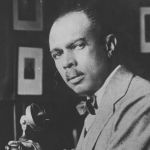Tiny bit of humanity,
Blessed with your mother’s face,
And cursed with your father’s mind.
I say cursed with your father’s mind,
Because you can lie so long and so quietly on your back,
Playing with the dimpled big toe of your left foot,
And looking away,
Through the ceiling of the room, and beyond.
Can it be that already you are thinking of being a poet?
Why don’t you kick and howl,
And make the neighbors talk about
“That damned baby next door,”
And make up your mind forthwith
To grow up and be a banker
Or a politician or some other sort of go-getter
Or—?—whatever you decide upon,
Rid yourself of these incipient thoughts
About being a poet.
For poets no longer are makers of songs,
Chanters of the gold and purple harvest,
Sayers of the glories of earth and sky,
Of the sweet pain of love
And the keen joy of living;
No longer dreamers of the essential dreams,
And interpreters of the eternal truth,
Through the eternal beauty.
Poets these days are unfortunate fellows.
Baffled in trying to say old things in a new way
Or new things in an old language,
They talk abracadabra
In an unknown tongue,
Each one fashioning for himself
A wordy world of shadow problems,
And as a self-imagined Atlas,
Struggling under it with puny legs and arms,
Groaning out incoherent complaints at his load.
Grow up and join the big, busy crowd
That scrambles for what it thinks it wants
Out of this old world which is—as it is—
And, probably, always will be.
Take the advice of a father who knows:
You cannot begin too young
Not to be a poet.


















Comment form: